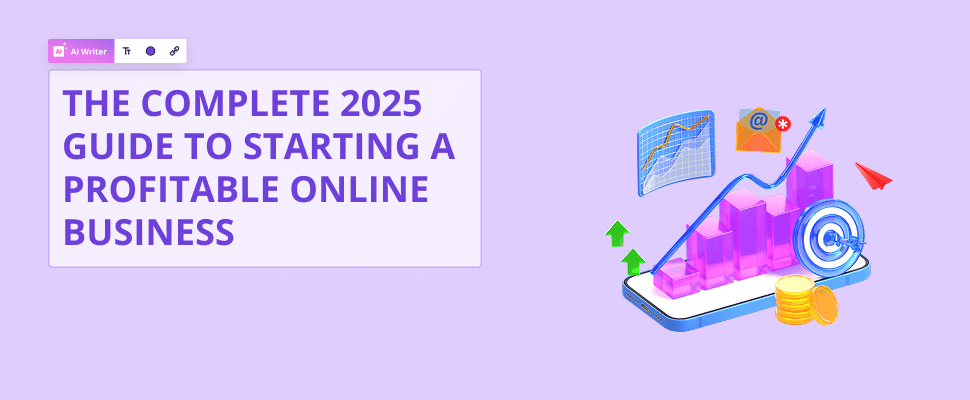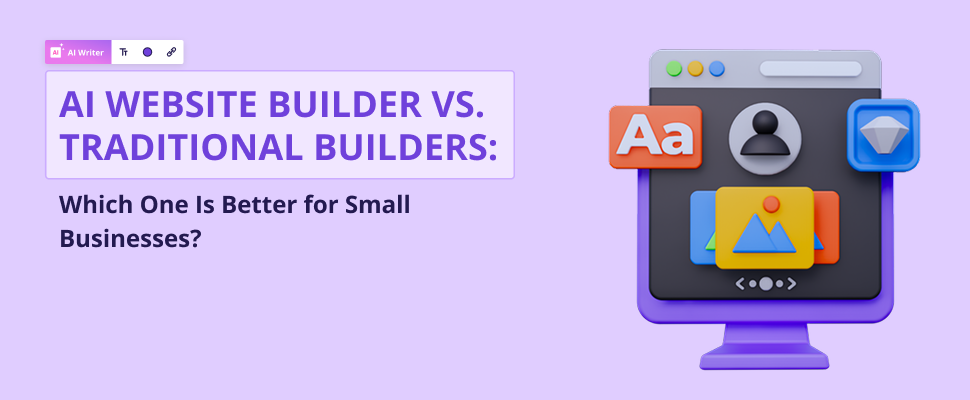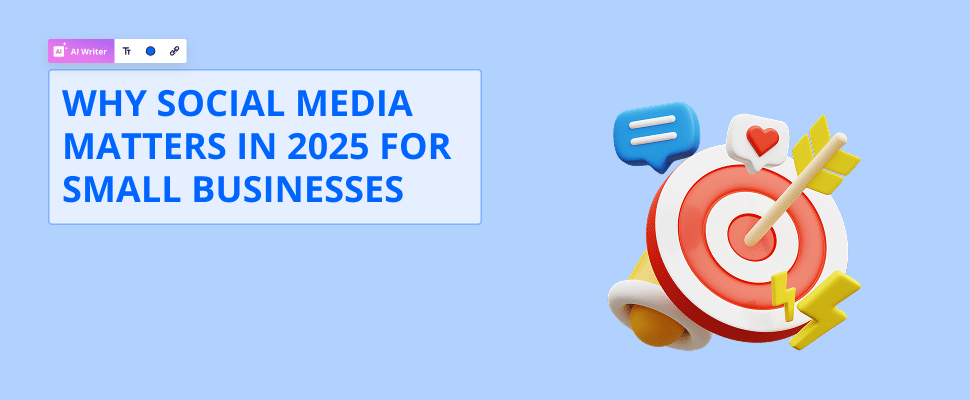
2025 Social Media Marketing Strategy for Small Businesses (Blueprint)
23 min to read
- Video and AI are mandatory for growth
- Integrate sales directly into social media
- Measure conversions, not just likes, for true ROI
Center your content around short-form video (the prioritized format) and use AI and automation tools to maintain consistency and efficiently scale your output.
Leverage Social Commerce features (like Instagram Shopping) to eliminate friction, allowing followers to purchase products instantly within the app.
Prioritize tracking key metrics like leads and direct sales (Conversions) over vanity metrics to ensure your social media.
Why Social Media Matters in 2025 for Small Businesses
Like it or loathe it, social media has ingrained itself into our daily lives. It is not only a place to post updates and share images anymore; instead, it is a place where almost five billion people connect daily, discover products, and decide what brands to trust. Instagram, TikTok, LinkedIn, and YouTube are platforms that have transformed into worldwide marketplaces. It is where even the smallest businesses can get noticed in a competitive world.
Table of Contents
2025 Social Media Statistics for Small Businesses you can’t ignore
· 4.9 billion active users worldwide – roughly 62% of the global population
· 90% of consumers research a brand on social media before making a purchase.
· 73% of buyers declare that the posts they see have a direct impact on the purchases they make
· 67% of marketers agree with the statement that social media yields the strongest results.
· Businesses typically see an average ROI of 5:1
What does this mean for small business owners? In essence, not paying attention to social media in 2025 is like letting both growth and revenue go unpicked.
Traditional Marketing vs Social Media: ROI in 2025
Not long ago, small businesses relied on TV spots, newspaper ads, or cold calls. These methods still exist, but have become costly and less effective. Social media changes the game by providing a direct line to your audience, enabling real-time conversations, affordable targeted advertising, viral reach, and clear, trackable data to optimize ROI.
The takeaway? Traditional marketing feels like shouting into the void, while social media enables you to initiate conversations that foster trust and drive sales.
The Ultimate Guide to Social Media Success for Small Businesses
1. Platform Priorities in 2025: Engagement, Relevance, Authenticity
Social media never stands still. People gather where they can connect, express themselves, and discover new products; while platforms evolve, the fundamentals remain: communities thrive on engagement, authenticity, and convenience. In 2025, five major networks dominate, each serving distinct audiences and offering unique opportunities for small businesses.
Social Media Platform Demographics and Usage
Facebook: The Community Hub (3.05B Users)
- Works best for: Small/local businesses, niche networking, and user base-driven growth
- Key features: Facebook Marketplace, Facebook Live, Groups, Events
- Content to focus on: Behind-the-scenes stories, company updates, engagement through groups
Instagram: Visual Storytelling (2B Users)
- Works best for: Lifestyle brands, influencer marketing, e-commerce
- Key features: Reels, Stories, Shopping, IGTV
- Content to focus on: Short-form video, high-quality visuals, user-generated posts
LinkedIn: Professional Networking (1B Users)
- Works best for: B2B, professional services, and becoming a thought leader
- Key features: LinkedIn Live, Articles, Company Pages, Sales Navigator
- Content to focus on: Case studies, step-by-step articles, posts about company culture, tips
TikTok: Short-Form Video Dominance (1.7B Users)
- Works best for: Viral campaigns, creative storytelling, entertainment
- Key features: TikTok Shop, Challenges, Duets
- Content to focus on: Authentic clips, trendy audio, short storytelling
X (formerly Twitter): Real-Time Conversations (450M Users)
- Works best for: Media, user interaction, live engagement
- Key features: Spaces, Lists, Moments, Twitter Ads
- Content to focus on: Customer support, industry news, quick takes
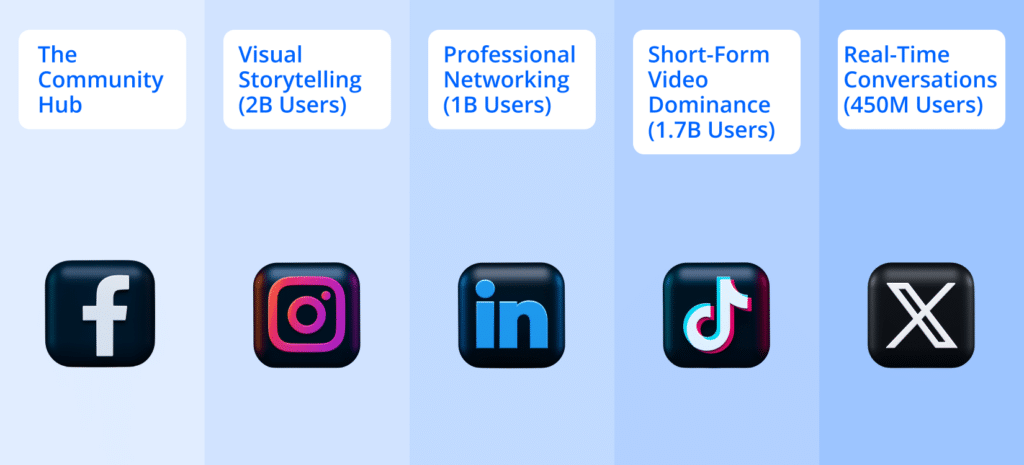
Current Social Media Algorithm Priorities
Algorithms do not forget to “reward” the best things: engagement, relevance, and truthfulness. These values are at the core of the user experience across all platforms.
- An account’s level of activity is measured by comments, shares, saves, and watch time.
- Short videos get 3x more engagement; live content sees up to 6x interaction.
- User-generated and unpolished posts often outperform corporate messaging.
2. AI-Powered Social Media: Content Creation & Automation in 2025
Artificial Intelligence isn’t just a buzzword anymore – it’s the engine driving modern marketing. What once required an entire marketing team can now be managed with the right mix of AI-driven tools and creativity. For small businesses, this means more freedom, less guesswork, and a better shot at competing.
Best AI Tools for Social Media Content (ChatGPT, Jasper, Canva, Lumen5)
Content creation is faster than ever with the help of AI-powered tools:
· ChatGPT: Generate ideas, write captions
· Jasper AI: Keep a consistent brand voice
· Canva AI: Create branded visuals
· Lumen5: Convert blog posts into videos
These tools amplify creativity, enabling consistent posting and experimentation without facing burnout.

Social Media Automation: Scheduling, Monitoring, Insights
Buffer, Hootsuite, and Later are platforms that provide you the option to schedule for several weeks, while advanced tools also:
- Suggest optimal posting times
- Monitor brand mentions across platforms
- Provide real-time performance insights
Small businesses can maintain a stylish, professional, yet personal, and responsive presence with the help of AI content creation and savvy automation.
3. Content Strategy That Converts
Social media is your online shop, advertisement, and customer service all in one. Moreover, sharing unplanned content in 2025 means wasting your time and effort, as the crowd is overwhelmed with information.
Brand Awareness in the Digital Age
- 90% of consumers research brands on social before buying
- Social media influences up to 73% of purchasing decisions
- Gen Z and Millennials rank social as their #1DiscoveryChannel
Content Pillars and Balance
Define 3–5 content pillars representing your brand’s value and rotate through them. For instance, for a wellness brand: Healthy Living Tips, Behind-the-Scenes, Customer Stories, New Product Launches.
Recommended mix:
- Educational content (40%): Tutorials, guides, problem-solving posts
- Behind-the-scenes and real-life stories (25%): Employee spotlights, personal insights
- User-generated and community content (20%): Testimonials, reposts, campaigns
- Promotional content (15%): Sales-driven posts with strong CTAs
It ensures a balance between engagement and measurable results.
Video as the Core Format
Video continues to outperform all other formats. Short-form dominates, but long-form storytelling is back on the rise on YouTube and LinkedIn. Live content, interactive features, and quick clips all play a role.
Your 2025 content strategy should not just include video – it should center around it.
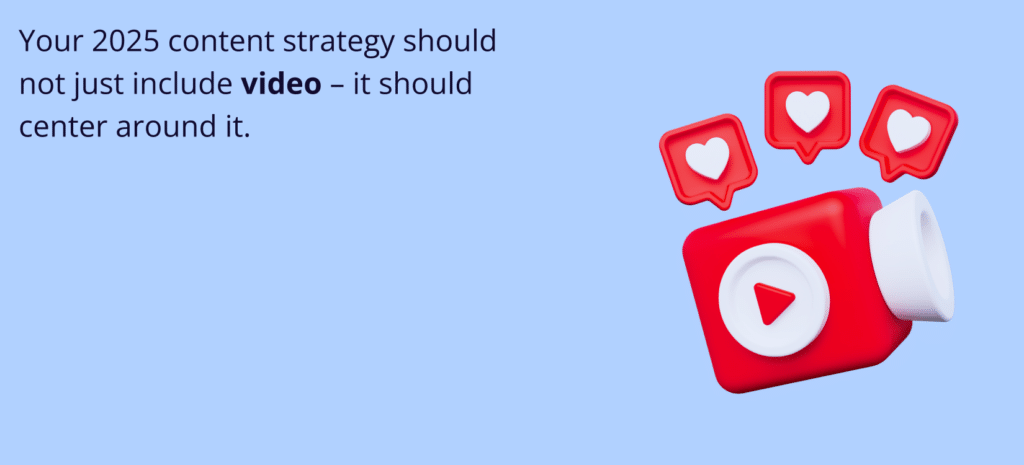
4. Social Commerce & Shopping Integration
In 2025, the walls between social media and e-commerce will have nearly disappeared. Platforms are no longer merely showcases – they’re fully functional sales channels where customers can discover, evaluate, and purchase products without leaving the app. For small businesses, leveraging social commerce is essential to avoid leaving sales on the table.
Instagram Shopping
Instagram offers advanced shopping features, such as shoppable posts, Stories stickers, and Reels with product tags, that transform casual browsing into seamless purchases. The Checkout feature enables users to buy directly within the app, reducing friction.
Success tips:
- Invest in high-quality visuals and clear product tagging
- Use limited-time collections, seasonal campaigns, and interactive Stories features
- Tell stories around your products, blending lifestyle and aspirational content into every touchpoint
TikTok Shop
TikTok’s e-commerce growth reshapes how younger audiences shop. Businesses can showcase products in short, creative videos, often paired with trending sounds or challenges. Live shopping events, which demonstrate products, answer questions, and offer exclusive deals, are becoming a cultural phenomenon.
Partnering with influencers amplifies results, offering social proof and relatability that traditional ads cannot match.
Facebook Marketplace and Shops
Facebook continues to lead in community-driven commerce:
- Marketplace provides free local exposure
- Facebook Shops create full digital storefronts integrated across Facebook and Instagram
- Messenger enables real-time, personal conversations that can convert inquiries into sales
Small businesses that embrace social commerce will turn passive followers into active customers.
5. Community Building & Engagement Strategy
A loyal community provides stability, advocacy, and long-term growth. Algorithms change, but engaged followers remain a business asset.
The Role of Community Management
Community building is about starting conversations and “creating belonging.” Successful businesses dedicate resources to:
- Responding to comments and questions
- Fostering discussions beyond sales
Timely responses are crucial – brands replying within an hour see higher satisfaction.

Turning Customers Into Advocates
Loyal customers can become brand advocates through:
- Loyalty programs, early access, or recognition
- User-generated content campaigns, hashtag challenges, testimonials
Highlight advocates publicly – reposts, “customer of the month,” or giveaways make followers feel valued and amplify reach organically.
6. Analytics & KPIs: How to Measure Social Media ROI
Without measurement, social media becomes conjecture. In 2025, analytics focus on business results, not just vanity metrics.
Key Metrics to Monitor
- Engagement: Likes, comments, shares, saves, overall rate
- Reach and impressions: How many see your content and how often
- Audience growth and demographics: Who responds to your content
- Conversions: Website traffic, leads, sales, customer acquisition costs
Platform-Specific Insights
- Instagram: Post performance, audience peaks, shopping interactions
- TikTok: Video completion, trending content, engagement drivers
- LinkedIn: Professional demographics, post engagement
- Facebook: Group activity, Marketplace inquiries, page reach
Advanced businesses integrate social analytics with CRM or e-commerce data for a complete view of social content’s impact on leads, sales, and long-term value.
7. Paid Social Advertising in 2025: Where to Invest
Organic reach is limited. Paid advertising allows small businesses to scale effectively in 2025. Precision is key – reach the right people with the right message at the right time.
Platform Ad Strengths
- Facebook & Instagram: Broad targeting, retargeting, engaging formats like carousels and Stories
- TikTok: Trend-driven campaigns that drive awareness and impulse purchases
- LinkedIn: B2B lead generation through sponsored posts, lead forms, and InMail
- X (Twitter): Real-time engagement around trends, hashtags, and live discussions
Creative and Optimization
Success depends on strong visuals, concise messaging, and clear CTAs. A/B testing headlines, images, and formats reveals what resonates the most. Ads must be mobile-optimized, fast-loading, visually sharp, and linked to mobile-friendly landing pages.

8. Crisis Management & Reputation Protection
Even careful brands face challenges such as negative reviews, public criticism, or global events. Quick, transparent responses prevent long-term damage.
Prevention Through Monitoring
Social listening tools track mentions, sentiment, and potential issues; therefore, monitoring competitors and industry trends provides early warning signs to avoid potential challenges.
Response Strategies
When a crisis occurs:
- Respond quickly – within the first hour if possible
- Acknowledge the problem, provide the solution, if appropriate, suggest next steps
- Speak openly and clearly, giving empathy and showing readiness to help
- Record the revelations to be a source of strength and quality improvement
Your 90-Day Social Media Transformation Roadmap
Whether your goal is to build brand awareness, generate leads, or increase sales, this step-by-step plan will guide you through building a powerful social presence – without feeling overwhelmed.
Month 1: Foundation & Setup
Focus on building strong foundations so every action compounds. Start by auditing your profiles for consistent handles, precise logos, and concise bios with CTAs. Switch to business accounts, set up tracking tools, and ensure trust by adding privacy policies, shipping details, and contact options. Claim vanity URLs, pin a welcome post, and prepare your content framework by defining 3–5 content pillars, creating a calendar, preparing templates, and planning your first batch of content.
Month 2: Content Production & Community
Execution is key: produce, publish, and engage consistently. Start a short and long video series of tutorials, demos, tips, and behind-the-scenes. Writing platform-specific captions, scheduling posts, and setting engagement rules, including prompt responses to inquiries, are the activities you can perform. The primary sources of community engagement can be daily activities such as user-generated content campaigns, collaborations with niche micro-creators, and paid advertising to test reach and engagement.
Month 3: Optimize, Scale & Plan
Apply all the insights to strengthen and grow your strategy. Measure the performance of the content (test different approaches using hooks, thumbnails, or CTAs, inspect funnels and mobile UX, and monitor ROI). Increase the use of successful content, adapt it into different formats, discover new platforms, formalize influencer partnerships, and set measurable goals for the next 90 days, such as the number of engaged followers or website conversions.
Conclusion
Social media is a long game, but with short, focused sprints. The distinguishing factors between just “noise” and actual revenue are in structure, consistency, and performance measurement.
Your Competitive Advantage
Utilize this blueprint to:
- Build communities that advocate for your brand, lowering acquisition costs
- Use AI and automation to scale output while preserving authenticity and quality
- Center content on video, the format platforms reward most in 2025
- Integrate commerce, so discovery turns into purchase with minimal friction
- Measure and optimize using data for predictable, repeatable growth
Start Your Social Media Journey Today
The social media landscape has never been more accessible or powerful. With AI tools, automation, and the right strategies, you can build a presence that drives real business growth.
Ready to dominate social media? Start with Hocoos AI website builder to create a website that complements your social media strategy, implementing these strategies step by step!
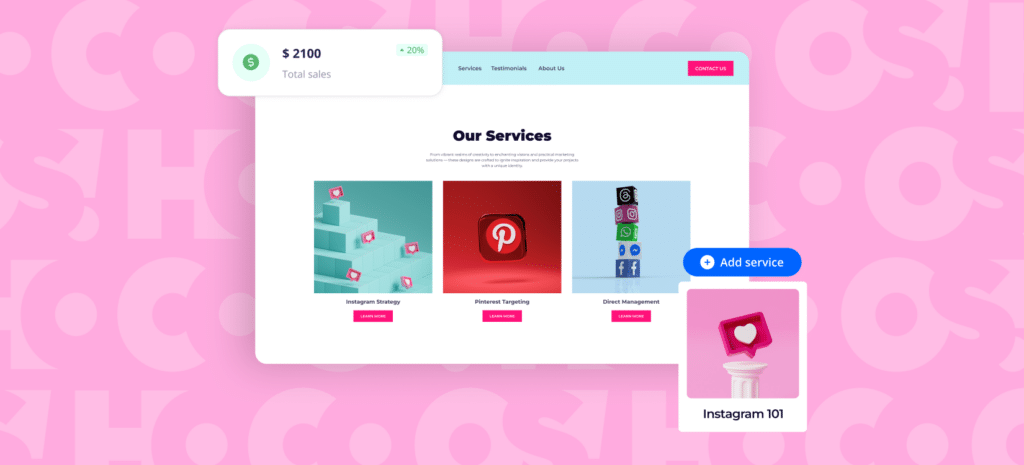
Frequently Asked Questions (FAQs)
Which social media platform is most important for a small business in 2025?
The “best” platform depends on your audience and niche, but TikTok and Instagram are crucial for organic reach due to their focus on short-form video. However, Facebook is still essential for community building and local commerce.
How can small businesses compete with large brands on social media?
Small businesses win through authenticity and deep community engagement. Focus on unpolished, behind-the-scenes content and provide timely, personal customer service to build trust that large brands often can’t match.
Is it necessary to use AI tools for my 2025 social media strategy?
While not strictly mandatory, AI tools like ChatGPT and Canva are highly recommended as they significantly boost efficiency for content creation and scheduling. This allows small businesses to maintain a professional, consistent presence without needing a large marketing team.
What is the most effective type of content to post for high engagement?
Short-form video (Reels, TikToks) is the most rewarded format by current algorithms, seeing up to 3x more engagement than static posts. Ensure your videos are authentic, use trending audio, and include a strong hook in the first few seconds.
How often should I be posting content to remain relevant?
Consistency is more important than volume; aim for quality over quantity. Most businesses find success posting daily on visual platforms (Instagram, TikTok) and 3–5 times per week on others (Facebook, LinkedIn) while supplementing with active Stories/Live content.
FOLLOW us


